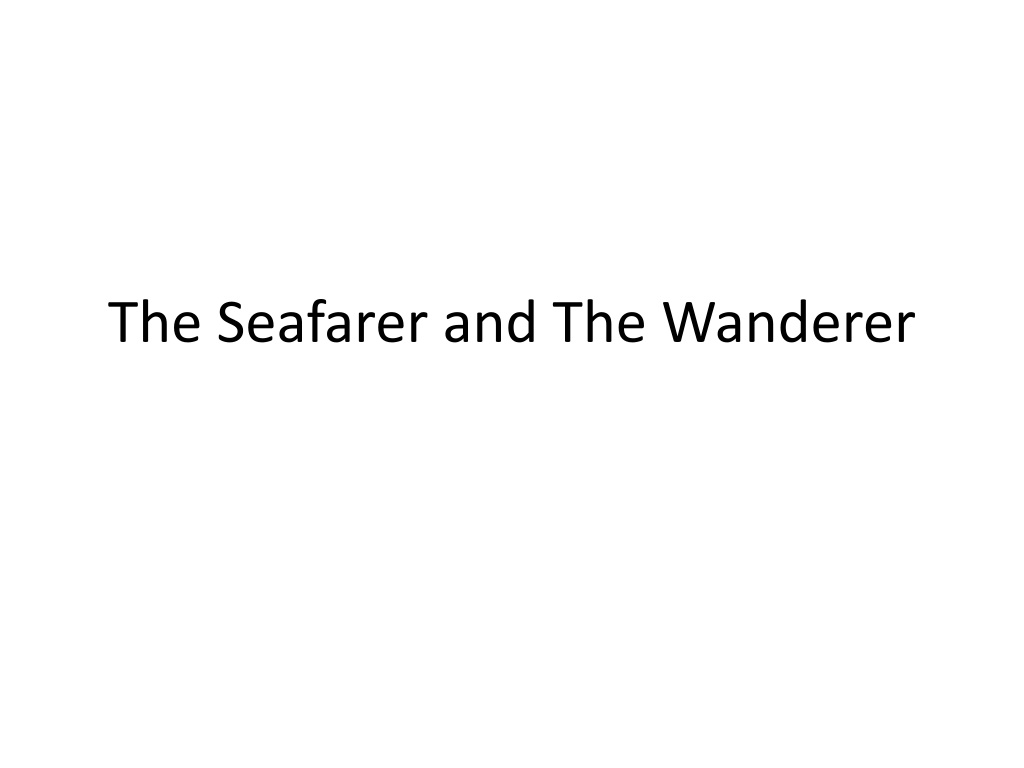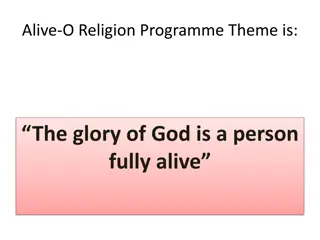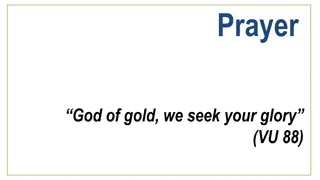Reflections on "The Seafarer" and "Glory Days
Reflecting on the themes of longing, loss, and contemplation in "The Seafarer" and "Glory Days" by Bruce Springsteen. The juxtaposition of the ancient poem's mournful contemplation with the modern song's nostalgic reminiscence provides a rich exploration of human emotions and experiences across time.
Download Presentation

Please find below an Image/Link to download the presentation.
The content on the website is provided AS IS for your information and personal use only. It may not be sold, licensed, or shared on other websites without obtaining consent from the author.If you encounter any issues during the download, it is possible that the publisher has removed the file from their server.
You are allowed to download the files provided on this website for personal or commercial use, subject to the condition that they are used lawfully. All files are the property of their respective owners.
The content on the website is provided AS IS for your information and personal use only. It may not be sold, licensed, or shared on other websites without obtaining consent from the author.
E N D
Presentation Transcript
Glory Days, Bruce Springsteen I had a friend was a big baseball player back in high school He could throw that speedball by you Make you look like a fool boy Saw him the other night at this roadside bar I was walking in, he was walking out We went back inside sat down had a few drinks but all he kept talking about was My old man worked 20 years on the line and they let him go Now everywhere he goes out looking for work they just tell him that he's too old I was 9 nine years old and he was working at the Metuchen Ford plant assembly line Now he just sits on a stool down at the Legion hall but I can tell what's on his mind Glory days well they'll pass you by Glory days in the wink of a young girl's eye Glory days, glory days Glory days well they'll pass you by Glory days in the wink of a young girl's eye Glory days, glory days Well there's a girl that lives up the block back in school she could turn all the boy's heads Sometimes on a Friday I'll stop by and have a few drinks after she put her kids to bed Her and her husband Bobby well they split up I guess it's two years gone by now We just sit around talking about the old times, she says when she feels like crying she starts laughing thinking about Now I think I'm going down to the well tonight and I'm going to drink till I get my fill And I hope when I get old I don't sit around thinking about it but I probably will Yeah, just sitting back trying to recapture a little of the glory of, well time slips away and leaves you with nothing mister but boring stories of glory days
The Seafarer Translated by Burton Raffel Composed by an unknown poet
The Seafarer the cold, hard facts Can be considered an elegy, or mournful, contemplative poem. Can also be considered a planctus, or complaint. This would involve a fictional speaker and a subject that may be loss other than death. Regardless, the expression of strong emotion is the key.
The Seafarer the cold, hard facts cont. What the poem has that most Anglo-Saxon poems also have: 1. Caesuras pause in a line 2. Alliteration joins the 2 parts of the line 3. Kennings metaphorical phrases
The Seafarer the cold, hard facts Caesura and alliteration in action The only sound / was the roaring sea Kennings coldest seeds = hail givers of gold = Anglo-Saxon kings
The Seafarer the cold, hard facts A wraecca tells his tale; he is at sea. (A wraecca was a person who had been exiled from his community.) Poem highlights the balance between the Anglo-Saxon belief in fate, where everything is grim and overpowering, and the Christian believer s reliance on God.
The Seafarer the cold, hard facts The land represents safety and security. The sea represents hardship and struggle, but the man is drawn to it because it brings him closer to God. The sea represents the power of God. Home represents heaven or being closer to God.
The Wanderer Translated by Charles W. Kennedy
The Wanderer This work is considered the most nearly perfect in form and feeling of all the surviving Old English poems.
The Wanderer Dates back to 700 AD when Scandinavia was in upheaval. Immigrants used songs and poems to keep their homelands alive.
Exile = separation from ones home or native country For an Anglo-Saxon warrior this meant losing his Lord and his mead hall.
Wraecca a word meaning wretch, stranger, unhappy man, and wanderer
Literary Terms you need to know Stoicism Tone Litotes Motif
Stoicism a state where a human does not show or feel any emotion completely indifferent, not just hiding feelings
Tone the attitude of a literary work toward its subject and the audience (formal vs. informal, humorous vs. serious)
Litotes a characteristic figure of speech in Old English poetry a form of understatement in which a thing is affirmed by stating the negative of its opposite (think double negative) (ie. She was not unkind = She was kind)
Motif a recurring literary element that serves as the basis for expanding the narrative (music When it is heard, the couple falls in love.)
First motif found in The Wanderer Ubi sunt que ante nos fuerunt? (Latin for Where are they who before us went?) Lines 90 94 They are nostalgic or seeking the past.
Second motif found in The Wanderer Mutability = the inevitability of change. Things are going to change. This is at odds with the concept of nostalgia. As a result, this poem has 2 conflicting motifs in action.
The Wanderer in a nutshell A stoic wraecca is at sea remembering the mead hall and his lost life.























